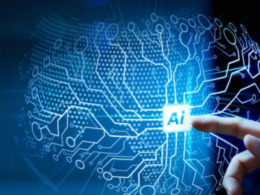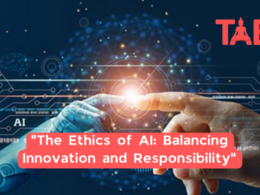Introduction
AI engineers are at the forefront of technological innovation. Their responsibilities include designing, developing, and implementing AI solutions with applications ranging from self-driving cars to natural language processing. With India’s increasing focus on AI, these experts Demand high salaries due to their specialized skills.
What is an Artificial Intelligence (AI) Engineer?
An Artificial Intelligence (AI) Engineer is a professional who specializes in designing, developing, and implementing artificial intelligence solutions and systems. These engineers are crucial in creating software applications, algorithms, and models that mimic human intelligence, learn from data, and make decisions or perform tasks autonomously. Here are some key responsibilities and areas of expertise associated with AI Engineers:
- Algorithm Development:
AI Engineers are skilled in designing and optimizing algorithms that allow machines to process and interpret data, make predictions, and solve complex problems. They work with various machine learning and deep learning techniques.
- Data Preparation:
They collect, clean, and prepare datasets for training and testing machine learning models. Data quality is essential for the success of AI systems.
- Machine Learning Modeling:
AI Engineers build and train machine learning models using libraries and frameworks such as TensorFlow, PyTorch, or sci-kit-learn. They select the most suitable algorithms for specific tasks, tune hyperparameters, and validate model performance.
- Deep Learning:
Besides conventional machine learning techniques, AI Engineers work with deep neural networks, Convolutional neural networks (CNNs), recurrent neural networks (RNNs), and numerous other deep learning architectures, which are employed for tasks like image recognition, natural language processing, and more.
- Natural Language Processing (NLP):
Some AI Engineers specialize in NLP, focusing on text analysis, sentiment analysis, language translation, chatbots, and speech recognition.
- Computer Vision:
Others specialize in computer vision, working on applications like image and video analysis, object detection, facial recognition, and autonomous navigation for robots and drones.
- Reinforcement Learning:
AI Engineers may also delve into reinforcement learning, which involves training agents to make decisions through trial and error, often used in robotics and gaming.
- Deployment and Integration:
They are responsible for deploying AI models into production environments, optimizing performance, and integrating AI systems with existing software or hardware.
- Continuous Improvement:
AI Engineers continuously monitor and fine-tune AI models to ensure they adapt to changing data patterns and remain accurate and efficient over time.
- Ethical Considerations:
They need to assess the ethical implications of AI systems, including bias and fairness, and take measures to mitigate any potential harm.
- Collaboration:
AI Engineers often work closely with data scientists, software developers, domain experts, and other professionals to understand business requirements and develop AI solutions that align with organizational goals.
Where to learn Artificial Intelligence (AI) Engineer
Learning to become an Artificial Intelligence (AI) Engineer involves a combination of education, practice, and continuous self-improvement. Here are some recommended steps and resources to learn AI engineering:
- Digital courses and MOOCs (Massive Open Online Courses):
Platforms like Coursera, edX, and Udacity offer comprehensive AI engineering courses from top universities and institutions. Look for courses such as:
- “Deep Learning Specialization” by Andrew Ng on Coursera.
- “Artificial Intelligence MicroMasters” program on edX by Columbia University.
- “AI for Robotics Nanodegree” on Udacity.
- Books and Textbooks:
There are many excellent books on AI engineering, such as “Deep Learning” by Ian Goodfellow, Yoshua Bengio, and Aaron Courville and “Artificial Intelligence: A Modern Approach” authored by Stuart Russell and Peter Norvig.
- Coding and Tools:
Gain proficiency in programming languages used in AI, primarily Python. Learn how to use libraries and frameworks like TensorFlow, PyTorch, Keras, and Scikit-learn.
- Practical Projects:
Practice by working on AI projects. Start with simple tasks and slowly move on to more complex projects. Platforms like Kaggle offer datasets and competitions to test your skills.
- Machine Learning and Data Science:
Understand the fundamentals of machine learning, as AI engineering often builds upon machine learning techniques. Consider taking machine learning and data science courses if you don’t already have a background in these areas.
- AI Ethics and Responsible AI:
Learn about the ethical considerations in AI engineering, including bias, fairness, transparency, and accountability.
- University Programs:
If you prefer a structured approach, consider enrolling in a university program that offers a degree or certification in AI or machine learning.
- AI Internships and Workshops:
Seek internships or workshops in AI-related roles or organizations. Practical experience is invaluable.
- AI Blogs and YouTube Channels:
Follow AI experts, bloggers, and YouTube channels dedicated to AI topics. They often provide tutorials, insights, and practical tips.
- Online Certifications:
Consider obtaining certifications in AI from organizations like Microsoft, Google, or AWS to validate your skills.
Which type of education and degree is required for Artificial Intelligence (AI) Engineer
Depending on the specific job, industry, and level of expertise you aim to achieve. However, here are some typical educational paths and qualifications That can help you chase a career as an AI Engineer:
- Bachelor’s Degree:
Many AI Engineers start with a bachelor’s degree in a related field, such as:
- Computer Science
- Mathematics
- Statistics
- Electrical Engineering
- Physics
- Computational Neuroscience
- Robotics
- Master’s Degree:
While not always required, a master’s degree can provide a deeper understanding of AI concepts and make you more competitive in the job market. Relevant master’s programs include:
- Master’s in Artificial Intelligence
- Master’s in Machine Learning
- Master’s in Computer Science, including a specialization in Artificial Intelligence
- Master’s in Data Science
- Ph.D. (Doctorate):
Ph.D. programs are typically pursued by those interested in research, academia, or specialized roles in AI. A Ph.D. can lead to opportunities for cutting-edge research and leadership positions.
- Online Courses and Certifications:
Many professionals in AI engineering augment their formal education with online courses, certifications, and self-study. Online platforms like Coursera, edX, and Udacity offer AI-related courses and certifications.
What career opportunities are available for Artificial Intelligence (AI) Engineers?
The scope of Artificial Intelligence (AI) Engineers is quite promising and continues to grow rapidly. AI has become a transformative technology across various industries, and AI Engineers play a pivotal role in developing and deploying AI solutions. Here’s an overview of the scope for AI Engineers:
- High Demand for AI Skills:
AI Engineers are in high demand across healthcare, finance, automotive, e-commerce, and more industries. As organizations increasingly adopt AI to improve efficiency and make data-driven decisions, the need for skilled AI Engineers continues to rise.
- Diverse Career Opportunities:
AI Engineers have many career opportunities, including Machine Learning engineers, Computer Vision engineers, Natural Language Processing engineers, Data Scientists, AI Research Scientists, and AI Product Managers.
- Industry-Specific Applications:
AI Engineers can work in specialized domains, such as healthcare (medical imaging and drug discovery), finance (algorithmic trading and risk assessment), and autonomous vehicles (self-driving cars), tailoring AI solutions to specific industry needs.
- Research and Development:
For those interested in pushing the boundaries of AI technology, careers in research and development (R&D) offer opportunities to contribute to cutting-edge advancements in AI.
- AI Startups:
The startup ecosystem thrives with companies focused on AI innovations. AI Engineers can be part of entrepreneurial ventures, where they have the chance to shape the future of AI technology.
- Consulting and Services:
Consulting firms and service providers are increasingly offering AI services to clients. AI Engineers can work in consulting roles to help organizations implement AI strategies.
- Academia and Education:
AI Engineers holding advanced degrees can opt for paths in academia, becoming professors or researchers who play a pivotal role in developing the ability and skills of upcoming AI experts.
- Remote Work Opportunities:
Many AI roles can be performed remotely, allowing for a flexible work environment and the potential to collaborate with global teams and clients.
- Ethical AI Roles:
As AI ethics becomes a significant concern, there is a growing demand for AI professionals who can ensure responsible AI development and mitigate bias, fairness, and transparency issues.
Salary of Artificial Intelligence (AI) Engineer?
Salaries for Artificial Intelligence (AI) Engineers can vary significantly between the United States and India due to differences in cost of living, demand for AI talent, and other factors. Here are the approximate salary ranges for AI Engineers in both countries:
India:
- Entry-Level AI Engineer: In India, entry-level AI Engineers can expect to earn income ranging from INR 4 lakh to INR 10 lakh per year, depending on factors like the city and the organization.
- Mid-Level AI Engineer: Mid-level AI Engineers with a few years of experience typically earn between INR 10 lakh to INR 20 lakh annually.
- Senior AI Engineer: Experienced AI Engineers with substantial expertise can earn salaries ranging from INR 20 lakh to INR 40 lakh or more annually.
- AI Research Scientist or Director: Those in research or leadership roles may earn salaries exceeding INR 40 lakh to INR 1 crore or more per year, depending on their qualifications and the organization.
United States (US):
- Entry-Level AI Engineer: In the US, entry-level AI Engineers can earn annual earnings ranging from $80,000 to $120,000 or more, depending on location and specific skills.
- Mid-Level AI Engineer: Mid-level AI Engineers with a few years of experience typically earn between $120,000 and $160,000 annually.
- Senior AI Engineer: Experienced AI Engineers with significant expertise can earn salaries ranging from $160,000 to $250,000 annually.
- AI Research Scientist or Director: Those in research or leadership roles may earn salaries exceeding $200,000 to $300,000 or even more per year, depending on their qualifications and the organization.









